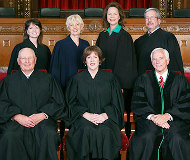12/20/2016
Ohio Supreme Court Orders Access To Police DashcamsRequest for boring police chase footage forces Ohio Supreme Court decision opening access to dashcam video.

The Cincinnati Enquirer newspaper demanded access to an hour's worth of footage from an uninteresting Ohio State Highway Patrol freeway chase. When the state Department of Public Safety (DPS) refused to hand over the video, the Enquirer had its opportunity to set a precedent with a lawsuit. It worked, as the state Supreme Court ruled that the public should, with limited exception, have access to police dashcam recordings.
"We begin with the premise that public records are the people's records, and that the officials in whose custody they happen to be are merely trustees for the people," Justice Judith L. French wrote, citing past open records cases. "The dashcam recordings fit within the definition of a 'record' because they document governmental activities, decisions, and operations during a traffic stop and pursuit."
The Enquirer sought video from a January 22, 2015 pursuit on Interstate 71 involving the stolen maroon Ford Fusion driven by Aaron Teofilo. Dispatchers sent Trooper Laura Harvey after the Ford, which had been reported as swerving off the road. When she caught up to the vehicle, Teofilo refused to pull over. Trooper Cristian Perrin joined Trooper Harvey in the twenty-minute pursuit that ended with the Fusion slamming into a guardrail in Hamilton County.
There was no misconduct captured on the footage from the troopers' squad cars. Troopers arrived at the crashed Fusion, and Teofilo was ordered out of the Ford, handcuffed and placed in the back of the squad car without drama. He admitted he stole the Fusion and was headed back home to Alabama. Though it was not particularly interesting, prosecutors flatly rejected the initial request for the records.
"The dashboard camera video that you requested is part of an open criminal case that pertains to a law enforcement matter of criminal, quasi-criminal, civil, or administrative nature and whose release would create a high probability of disclosure of specific investigatory work product," DPS lawyers wrote in a response to the Enqurier.
Three months into the lawsuit, DPS decided to release the footage, but it was too late. The Enquirer wanted to push the issue all the way to the high court, which gave the justices an opportunity to rule that only specific footage that would directly impede a criminal prosecution can be withheld.
"A case-by-case review is necessary to determine how much of the recordings should have been disclosed," Justice French wrote for the court. "Based on our review of the recordings, we conclude that about 90 seconds of Harvey's recording -- when Harvey takes Teofilo to her patrol car, reads him his Miranda rights, and questions him -- could have been withheld as investigative work product compiled in anticipation of litigation. The remaining portions of the recordings, however, are not exempt from public disclosure"
The court pointed out that the video showed little that was not already described in publicly released police reports. Much of the video showed nothing of interest at all, as one squad car had its camera pointed at the highway median for half an hour. Justice William O'Neill wished his colleagues had gone further by forcing DPS to pay the Enquirer's legal bills.
"The majority's conclusion that the good faith of law enforcement outweighs the benefit to the public establishes a blueprint for state agencies to stonewall valid requests for public records and then assert a good-faith defense when called into court," Justice O'Neill wrote in a partial dissent. "This could have a serious chilling effect on the willingness of the press to litigate public-records requests all the way to the Supreme Court of Ohio. Our failure to award attorney fees to the prevailing party essentially rewards bad behavior. 'Catch me if you can' should not be the legal standard applied in important policy questions."
A copy of the ruling is available in a 70k PDF file at the source link below.


